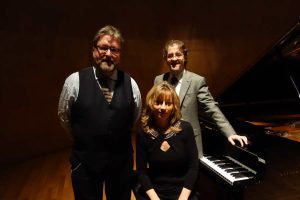
left, Peter Mack, right Christopher Bowlby, and below Ivona Kaminska
Esteemed artist-teacher, concert artist, and current National Music Teacher’s National Association president, and long-time friend of the SIPF, recently we asked to hear how Peter Mack reminisces about his experiences regarding the Seattle International Piano Competition and Festival. Here is a brief exchange about his successes and insight.
Ivona Kaminska: You have always been extremely supportive of SIPF. Can you comment on which aspects of our competition make it interesting or appealing to you?
Peter Mack: I have been a big fan of SIPF from the very start.
I like the open aspect to the competitions, repertoire being left entirely up to the discretion of the competitor/teacher. I also like the fact that it is as free from bias as can possibly be. The screening jury is completely anonymous. In the finals, the jury members sit behind a screen so they can’t see anything of the competitors. Also, the competition information sheets given to the jury are devoid of any personal information about the performers. All the judges know of the participants is the repertoire the competitors play.
The competition even lays carpet from backstage to the piano so that eagle-eared judges can’t hear the click click click of high heels!
IK: You have had numerous winners since the very first edition from SIPF. Aside from the incredible talent of your students and your own teaching, is there any other secret you would want to share to prospective competitors at large?
PM: Because the performer has to make a big impression in a very, very short time, I think that they need to build in as much contrast as they can in their program. One long piece won’t be nearly effective as two, or even three shorter pieces. As much contrast as possible, that’s what tends to be the most successful in my experience.
IK: The SIPC was one of the first competitions that allowed free repertoire and now it seems that this trend has caught on. How does this approach differentiate performers and teachers? Is it an aid or a burden?
PM: I think it’s great! Students can choose the material that they play best. If they don’t enjoy a Bach Prelude and Fugue or a Chopin étude, they don’t have to do it. It’s very freeing.
IK: SIPF is, to the best of our knowledge, the only piano competition that holds a blind adjudicating process from beginning to end. Can you comment on that?
PM: As I said earlier, I think it’s one of the great assets of the competition. For some reason, judges just tend to reward male competitors more than females by and large. If you look at photographs of the finals of other major competitions, you usually see something like five males and one female, almost never an equal number. You never see more women than men/females than males. The first year that SIPF did a completely blind competition, of the four competitive categories, three were won by female competitors, only one by a male. That was eye-opening to me. I think it’s one of the great strengths of this competition.
IK: Anything else you would want to share with wider audience about SIPF?
PM: I’m delighted that it is thriving. It’s a very high standard, but if you win, you’ve really won something. I recommend it to everyone!
The deadline for the 2022 Seattle International Piano Competition approaches shortly. The competition invites participants of all nationalities and ages to apply. With over $18,000 in cash prizes, complete details of the 2022 edition may be found on the rules page. For the first time, the 2022 international competition will be run exclusively online.
Peter Mack was born in Ireland, where he had his early training with Frank Heneghan at the Dublin College of Music. Subsequent study was at Trinity College, Dublin, and with Bela Siki at the University of Cincinnati College Conservatory of Music and at the University of Washington where he earned his doctorate in piano performance.
Mack has performed throughout the United States and Europe, as well as in Australia and the former Soviet Union. He is the winner of the New Orleans, Young Keyboard Artists and Pacific International Piano Competitions. His prize in the Sherman–Clay competition included a Steinway grand piano. Mack is well known for his extensive repertoire, having performed twenty–five concertos with orchestras. He is equally in demand as a performer, clinician, convention artist, and teacher, and his pupils are frequent winners of local, national, and international competitions.
“Mack is one of those lucky ones, born with a completely balanced set of talents. He has perfect piano hands, his technique is all but infallible, he has boundless temperament, style and taste, and above all, he communicates directly…. In all capacities he is indefatigable….”
–Los Angeles Times





